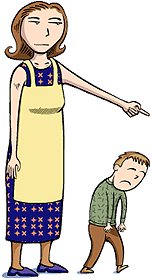Judge Says Treat High Conflict Parents Like Children
In an earlier blog post, I made reference to a November 2016 decision of the Honourable Mr. Justice Pazaratz and his denunciation of the parties’ practice of videoing each other with the child. In re-reading the Reasons in the Whidden and Ellwood case, I discovered commentary by Justice Pazaratz on a wealth of other relevant issues. The decision addresses a multitude of evils: videotaping children, audio-recording the other party, poorly done assessment reports – the list goes on. It is a great read. His Honour writes clearly, directly and honestly. No jargon or legalese to be found. The Reasons are long but very readable. I would commend the decision to anyone considering family law litigation. It serves as a warning of the damage done when family law cases (and parties) go off the rails. His Honour exposes the high conflict cases (and litigants) for what they are and loudly advocates for the children stuck in the middle of such disputes.
In Whidden and Ellwood, the parties’ nine year old daughter Taylor was the subject of a bitter custody dispute. The matter was an “actively litigated” file. Each parent blamed and considered the other parent a threat. Justice Pazaratz makes his views on the subject absolutely clear: the most pervasive threat to Taylor’s well-being was “the extreme and unbridled conflict” between the parties, not the relative shortcomings of one or the other of her parents. “It’s a problem because parents delude themselves into thinking they’re doing this “for the sake of their daughter. In reality Taylor doesn’t care who’s right or wrong. She doesn’t want to think of either of her parents as bad. She just wants them to stop fighting.”
Justice Pazaratz states that, when the parties separated, they could have and should have tried to work together, followed professional recommendations, obeyed court orders, and “tried to make this as painless as possible for their daughter. But instead they took a scorched earth approach. They became consumed not just with winning, but with making sure the other party lost.”
Justice Pazaratz ponders: “Perhaps we are so intent on protecting parents’ rights, that we lose sight of children’s rights: the right of children to have somebody step in and make their parents stop fighting — once and for all.”
“High conflict parents exude negativity and tension. If we in the courtroom can’t stand listening to these people act up – presumably while they’re on their best behaviour – can you imagine what it’s like for a child trapped living with that sort of hostility and resentment, 24 hours a day? Angry parents always pretend they hide their feelings from their children. But I don’t believe it for a second. Judges regularly receive reports from professionals about how severely children are impacted by ongoing parental strife. And in this case, the cell phone videos flaunted by both parties clearly demonstrated that no effort is being made to shield Taylor from the hatefulness. Family breakdown is tough on everyone. The pain is real. It takes time to recover. But healing can’t occur while you’re still waging war in court. That’s why – for the sake of the children – we need to find ways to reduce family tension, rather than fuel it.”
“When parents come to court genuinely seeking solutions, we should work tirelessly to help them. As long and as often as it takes. But we have a concurrent obligation — to taxpayers, and more importantly to the children of relentless litigators – to prevent embittered parents from abusing scarce judicial resources: We need to identify those parents who just come here to fight. And then do everything we can think of to deprive them of future opportunities to fight.
We need to anticipate – perhaps even presume – misconduct and non-compliance.
And then craft orders which leave parents with as few opportunities to misbehave as possible.”
“In short, sometimes we need to treat parents like children.”
Thank you Justice Pazaratz. Truer words have never been spoken.






